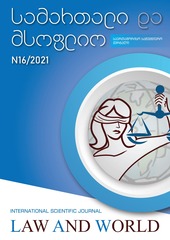სასამართლოს მიერ უკუძალის გამოყენების პრობლემატური საკითხები 
##plugins.themes.bootstrap3.article.main##
ანოტაცია
In most of the legal systems of the world, especially in Europe, speaking about the Principles of criminal law begins with the famous Latin expression: Nullum crimen sine lege. This Principle is often referred to as the Principle of Legality. This Principle requires that a person is held criminally liable under the governing law at the time of commission of the offence. One of the main requirements of this Principle is the prohibition of retroactive force in criminal law. Retroactive Force is a feature of law norms to apply to a case that had occurred before its enactment. The Principle of prohibition of Retroactive Force is a Principle of constitutional rank, which is not only a national but also a recognized international value. Paragraph "9" of Article 31 of the Constitution of Georgia stipulates that the law has no Retroactive Force if it does not mitigate or abolish liability. At the first glance, Article 3 of the Criminal Code of Georgia states in accordance with this: a criminal law norm that decriminalizes an act or reduces penalty, has retroactive force. A criminal law norm that criminalizes an act or increases punishment, has no retroactive force. As much as the requirement of the Constitution is quite broad and general in its nature, the wording of Article 3 of the Criminal Code of Georgia seems to narrow down the requirement of the Constitution. The paper discusses the compatibility of Article 3 of the Criminal Code with Article 31 of the Constitution of Georgia. The practice of the Constitutional Court is discussed and the author"s recommendations are presented.
##plugins.themes.bootstrap3.article.details##
როგორ უნდა ციტირება

ეს ნამუშევარი ლიცენზირებულია Creative Commons Attribution-ShareAlike 4.0 საერთაშორისო ლიცენზიით .





